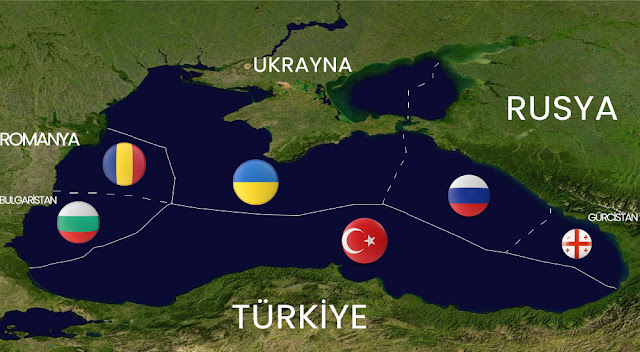Turkey’s Black Sea Policy
The tension in the north is very important for Turkey, both for the stability of the Black Sea region and for the sensitive continuation of international policy. It supports Ukraine's territorial integrity, even though it has to maintain relations with Russia. In this context, it does not recognize the annexation of Crimea by Russia and describes what is done as an occupation.
As the only NATO member with a coast to the Black Sea during the
Cold War period, Turkey provided security in the region against the Eastern
Bloc. Turkey, which emerged as a regional power in the Black Sea with the
collapse of the Soviet Union, has become a remarkable country with its new
cooperation proposals both in the field of security and in the field of
economy. Turkey, the traditional rival of Russia, followed active policies in
the region in the 1990s; The USA, which sees Turkey as an alternative to
Russia, which has assumed the leadership role, also supported this situation.
Turkey, which wants to ensure the continuation of the Montreux Convention in
the Black Sea and to become active in the region, has tried to achieve these
goals with the policies it follows.
Russia, on the other hand, considered the Black Sea basin to be of
key importance in the recovery process after the collapse of the Soviet Union,
and tried to balance the prestige it lost in the region with new energy and
trade policies. Especially in terms of transporting Caspian energy resources to
international markets, the Black Sea is of great importance. In the
high-tension negotiations between Ukraine and Russia, which started in 1992 and
lasted until 1997, the solution of the problem regarding the status of the
Black Sea Navy was provided by an agreement. However, the main problem is the
sovereignty issue of Crimea, which has often preceded other issues. In 1997,
Russia leased the Black Sea Naval Base in Sevastopol from Ukraine for 20 years
for an annual fee of 100 million dollars. In this way, although Russia managed
to maintain its military presence in the Black Sea, discussions on the status
of the region continued. The protests initiated by the opposition in the
capital Kiev in November 2013 attracted attention all over the world and the
effect it created caused great changes in the Black Sea region. The then
President Viktor Yanukovych's cooperation with Russia by canceling the
partnership agreement with the EU led to the reaction of the opposition. Viktor
Yanukovych, who could not manage the process, had to leave the country in
February 2014.
After Yanukovych left the country, the Ukrainian Parliament
dismissed the President and formed a provisional government, while the EU
showed that it was with the opposition, while Russia supported Yanukovych. On
February 27, 2014, Russia's aid to the Russian militias in Crimea and the
militias taking control of the region meant a new page was opened for both
Ukraine and the Black Sea.
In the developing process, the Crimean Parliament declared its
independence on March 16, and the Russian Federation also recognized this
decision. On March 21, 2014, Crimea was officially joined to Russia. With this
development, it is possible to say that the balances in the Black Sea have been
seriously shaken. After the collapse of the Soviet Union, Russia's Black Sea
Fleet, which remained under the sovereignty of Ukraine, necessitated
cooperation in the region for this state.
Russia, which is a signatory to Turkey's initiatives in the region,
has tried to pursue a policy in line with Turkey in the face of non-regional
actors. While the Moscow administration, like Ankara, was in favor of the
continuation of the Montreux Convention, this showed that the two regional
powers were acting to preserve the status quo in the Black Sea. However, with
the annexation of Crimea, the balance deteriorated in favor of Russia. With the
annexation, Russia, which also has the Sevastopol Port, found the opportunity
to move more comfortably in the Black Sea. Therefore, it has become doubtful
whether the harmony in the region will continue after the annexation.
The annexation of Crimea is also extremely important for Turkey.
Because both the historical ties with Crimea and the Turkish and Muslim people
in Crimea make it impossible for Turkey to remain indifferent to the region.
While the State of the Republic of Turkey stated that Ukraine's territorial
integrity should be respected in this process, it determined the rights of the
Crimean Tatars as the most important issue and conducted its arguments on this
issue. Especially the President of the Crimean Tatar National Assembly Mustafa
Abdul Cemil Kirimoglu made many visits to Turkey and received the "Order
of the Republic" from the then President Abdullah Gul.
Turkey, which attaches importance to the territorial integrity of
Ukraine and expresses its support to the Crimean Tatar people at every
opportunity, did not participate in the economic sanctions imposed on Russia by
the Western states, although there were many disagreements on political issues.
In addition, the prime minister of the time, Ahmet Davutoğlu, emphasized the
importance of diplomacy by saying that the connection between Kiev and Moscow
should never be cut off and that Europe does not need a new Berlin Wall. As a
matter of fact, this foreign policy pursued in a crisis environment aroused
confidence in Turkey on both the Ukraine and Russia fronts and contributed
greatly to the development of relations.
These two states, which have been living together around the Black
Sea for centuries and directing world politics, will choose cooperation instead
of crisis in the Black Sea region in the upcoming period, and will make
stability and prosperity dominant in the region. Otherwise, the Black Sea will
turn into a new conflict area and affect both countries negatively.
Ahmet Kaya






Yorumlar
Yorum Gönder